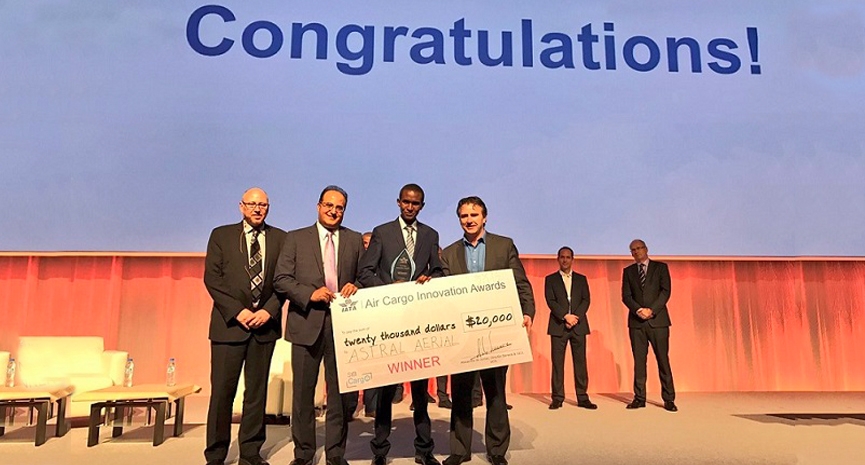FROM MAGAZINE: New face of Air Cargo Innovation
Air Cargo - Here’s the story of a boy who was fascinated by aeroplanes in his childhood in a remote Kenyan village pursued his dream of becoming an aeronautical engineer. In March this year Geoffrey Nyaga made his first plane journey of his life to Abu Dhabi as one of the five finalists of the IATA Air Cargo Innovation Awards.

Here's the story of a boy who was fascinated by aeroplanes in his childhood in a remote Kenyan village pursued his dream of becoming an aeronautical engineer. In March this year Geoffrey Nyaga made his first plane journey of his life to Abu Dhabi as one of the five finalists of the IATA Air Cargo Innovation Awards. He returned home with $20,000 prize money for an idea that sets to change the course of cargo delivery by unmanned aerial vehicles. Reji John reports.
Geoffrey Nyaga is 25 years old. He is from Likii, a small village on the slopes of Mount Kenya near Nanyuki town, which is about 200km from Nairobi, the capital city. He lives with his parents and his younger sister. His father owns a small retail shop while his mother assists in running the shop. He says it was “just enough to provide for our daily basic needs”.
“From as early as I can remember, I have always been fascinated by technology, specifically aeroplanes,” Geoffrey tells me as he gets himself wired for the first ever media interview of his life inside the majestic National Exhibition Centre in Abu Dhabi.
“I grew up watching military aircrafts fly above our village from Nanyuki Airbase and small aircrafts taking off and landing from Nanyuki airstrip. Despite having nobody from my extended family attend college, or anyone in our village working in aviation, I was always determined to pursue my dreams,” he adds.
It is the fascination for technology combined with his determination that led him to pursue his dream of completing his studies in Aeronautical Engineering from the Technical University of Kenya. With a first class honour Geoffrey graduated in December 2016 and immediately after he began his first job at Astral Aerial Solutions (AES), a subsidiary of Astral Aviation, a dedicated cargo airline with a strong African footprint. His first project was to build a UTM (UAV Traffic Management) concept that will safely manage UAS (Unmanned Aerial System) traffic and to operate Flyox, the indigenously made cargo drone.
Flyox has a payload capability of up to 2,000kg, 1,200 km range and flight time of up to 26 hours. It can land in unpaved airstrips and on water. It is designed to enable safe civilian UAV operations by providing pilots with information on altitude separation, restricted airspace and weather conditions. The project will lay the foundation for safe, secure and effective UAS operations and integrate into existing airspace to ultimately allow the expansion of air cargo in Africa. It can be deployed for aid and relief; medical supplies; mining, oil and gas; agriculture and e-commerce products.
It is this project that made Geoffrey win the top award at the IATA Air Cargo Innovation Award for 2017.
He received the award at the 11th World Cargo Symposium (WCS) in Abu Dhabi.
“We hope to be able to develop a pathway that will encourage regulators, operators and manufacturers to come together and pave the way forward for safe and efficient UAS use in the continent,” says Geoffrey.
Sanjeev Gadhia, the founder and CEO of Astral Aviation, who presented the project on behalf of Geoffrey, was delighted to have been recognized for the project. “Drone technology has strong potential to boost the continent’s air connectivity and deliver goods and services to remote regions and more critical lifesaving products to those in need,” says Sanjeev Gadhia.
Astral Aerial’s project seeks to lay the foundation for safe, secure and effective UAS operations and integration into existing airspace to ultimately allow the expansion of air cargo in Africa.
“It is great to see a developing nation company helping to drive the innovation that is needed throughout the global air cargo industry,” says Glyn Hughes, IATA’s Global Head of Cargo.
Geoffrey is still overwhelmed by the warm reception he received from IATA delegates and the acceptance of his project. “I was also impressed with the industry-wide drive to use new technologies and innovation to improve customer experience. This united voice by the industry towards adopting innovation, gave me hope that the cargo industry would be attractive to young talent wanting to join the aviation industry,” he adds.
At the WCS in Abu Dhabi, Geoffrey also joined IATA’s FACES programme. FACES or Future Air Cargo Executives Summit is IATA’s response to the industry’s need for young, aspiring and diverse professionals. The programme aims at attracting, retaining and developing a bright and diverse pool of individuals under 36 to prepare them to become the next generation of leaders in the Cargo Industry. It is a recurring event organized together with the IATA World Cargo Symposium every year in March. The next IATA WCS takes place in Dallas, US.


